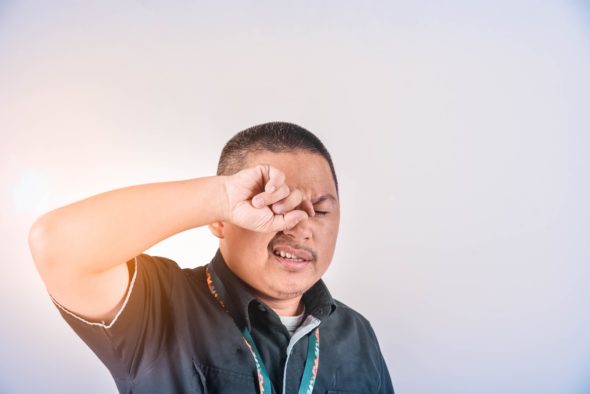
Spring and Your Pesky Eye Allergies
Posted April 21, 2020Millions of Americans suffer from seasonal allergies and their symptoms flare as spring blooms. These allergies aren’t always confined to an itchy, running nose. They can also mean itchy, swollen, running eyes.
If your spring allergies make you wish that spring didn’t exist, we are here to help. Don’t let your irritated eyes steal all the joy from this beautiful time of year.
Types of Allergies and Triggers
All allergies fall under one main heading: “allergic conjunctivitis”. They are caused by the misfiring of your immune system. When the body encounters a harmful substance, it reacts by releasing histamine, a chemical that causes swelling and inflammation. This is the chemical that makes the blood vessels in your eyes swell, resulting in red, teary, itchy, burning eyes. The idea is that you will never mess with that bad thing again.
Unfortunately, sometimes the body mis-categorizes something as harmful and reacts to that non-harmful thing in the same way. There are three main types of allergic conjunctivitis that result from things you encounter outside of your body:
- Seasonal (caused by pollen from grass, trees, flowers, weeds, etc)
- Chronic (caused by dust mites, pet dander, feathers, mold, etc)
- Contact (caused by makeup, perfume, cigarette and cigar smoke, car exhaust, chemicals
Symptoms
The best thing to do when you know you have eye allergies is to figure out your triggers and stay ahead of the symptoms. Sometimes you will have a reaction immediately or perhaps a few days after you encountered your trigger. Common symptoms include:
- Red, irritated eyes
- Itchiness
- Tearing or runny eyes
- Swollen eyelids
- Soreness, burning, or pain
- Sensitivity to light
- And other symptoms like a runny, stuffy nose and sneezing
Prevention
Once you can recognize your triggers and symptoms, it is time for prevention. These handy tips can save you a lot of trouble and discomfort later.
- Wash hands after touching animals/pets.
- Keep windows closed during peak pollen counts (use your AC)
- Wear sunglasses/glasses to block some of the pollen and outdoor allergens. Avoid contact lenses if possible.
- Do not touch or rub eyes.
- Rinse eyes with saline water or apply a cold, wet washcloth.
- Lubricate your eyes with eye drops to moisten them and wash out allergens.
- Buy mite-proof pillows, pillow-cases, and bedding to keep mite exposure to a minimum.
- Replace carpets and rugs with hardwood, tile, or linoleum to keep dander and dust mites at bay.
- Clean floors and surfaces with a damp rag or mop instead of dusting or sweeping.
- Use a dehumidifier to keep humidity levels low and avoid mold growth.
Treatment
Depending on the severity of your allergies, however, you may need medications even if you use preventative measures. Some of the same medicines used for nasal allergies work for eye allergies. Make sure that you always follow the directions on the bottle or those given to you by your doctor.
- Over-the-counter antihistamine drops and pills. These are for quick relief and should not be taken for more than 2-3 days. Common brands include Zyrtec, Benadryl, Allegra, Claritin, etc.
- Decongestant drops. These are often combined with the above option and shrink swollen blood vessels in your eyes so that they are not so red. Again, these should only be used for a few days.
- Prescription medications. These sometimes take longer to work, but their effects last longer. Many prescription drops/pills are taken before the symptoms hit. Common brands include: Crolom, Alomide, Alocril, Alamast, etc. Steroid eye drops may also be prescribed for severe, long-lasting symptoms.
- Immunotherapy. If you are still having symptoms, your doctor may suggest allergy shots or pills. These give your body doses of the allergen so that it can grow used to it.
If you have severe pain or vision loss as a result of your allergies (or medications), call your doctor immediately.
Even though spring allergies can be frustrating, there are ways to manage and treat them. Remember that another main part of anticipating your allergies involves staying on top of your regular eye visits. Allergy season is one of the most important times to check in with your eye doctor. Don’t hesitate to reach out to either of our Christiansburg or Salem locations by phone or email.
